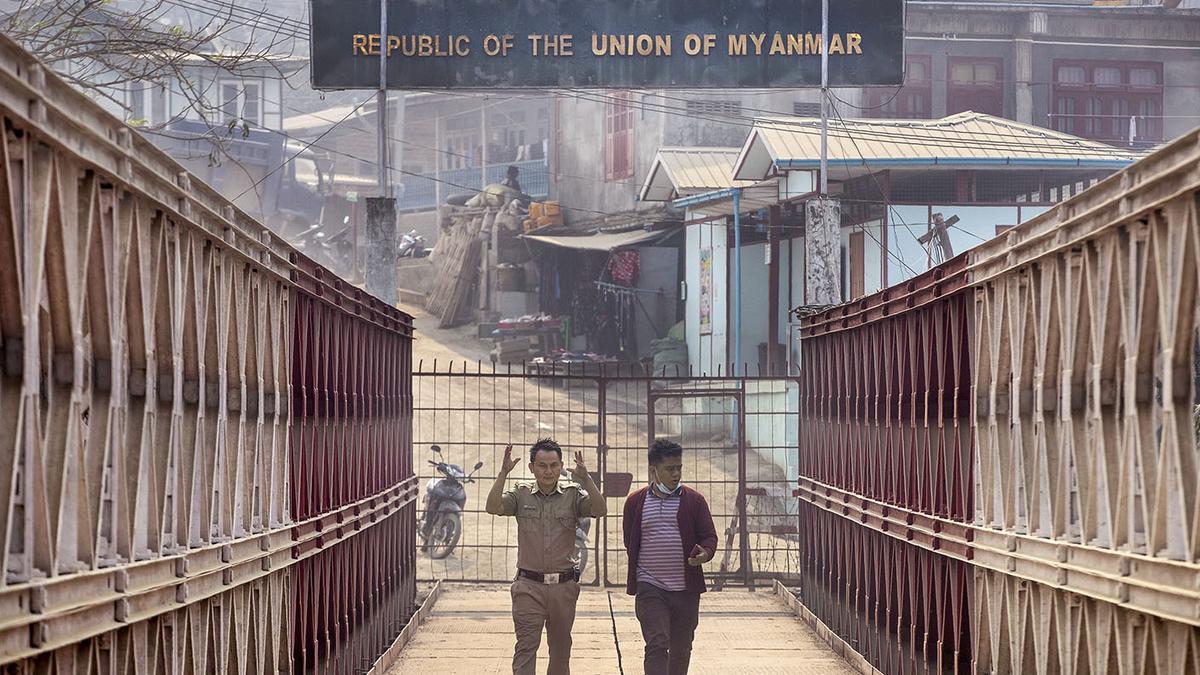Britain And Australia's Myanmar Policy: A Double Standard?

Table of Contents
Britain's Myanmar Policy: A Focus on Sanctions and Diplomatic Pressure
Britain's response to the Myanmar crisis has primarily centered on targeted sanctions and diplomatic pressure.
Sanctions Regime
The UK has implemented a robust sanctions regime targeting key figures within the Myanmar military junta, associated businesses, and entities involved in human rights abuses.
- Types of sanctions: These sanctions encompass asset freezes, travel bans, and trade restrictions on individuals and entities deemed responsible for undermining democracy and perpetrating violence.
- Effectiveness of sanctions: The effectiveness of these sanctions remains a subject of ongoing debate. While they aim to cripple the junta's financial resources and limit its access to international markets, their impact is often hampered by loopholes and the junta's ability to circumvent restrictions.
- Loopholes and criticisms: Critics argue that the sanctions haven't been comprehensive enough, leaving loopholes that allow sanctioned individuals and entities to continue operating through proxies or alternative channels. Specific examples of sanctioned individuals include Min Aung Hlaing, the head of the military, and several other senior generals. Sanctioned entities often include military-owned conglomerates like Myanma Economic Holdings Limited (MEHL) and Myanmar Economic Corporation (MEC).
Diplomatic Engagement
Britain has actively engaged with ASEAN (Association of Southeast Asian Nations) and the United Nations, advocating for a peaceful resolution to the crisis and pushing for accountability for human rights violations.
- Statements by British officials: British officials have consistently condemned the military coup and called for the restoration of democracy in Myanmar. They have publicly supported the NUG and called for the release of political prisoners.
- Participation in international initiatives: The UK has actively participated in UN Security Council resolutions concerning Myanmar and has worked with international partners to coordinate responses.
- Support for the NUG: Britain has offered diplomatic recognition and support to the NUG, the shadow government formed by opponents of the military regime, albeit this is a controversial step with limited international recognition. The limitations of diplomatic pressure are evident in the junta's continued defiance of international calls for dialogue and a return to democratic rule.
Support for Civil Society
The UK has provided funding and support to human rights organizations and civil society groups operating within Myanmar, despite the significant risks they face.
- Funding provided: The UK government channels aid through various international organizations and NGOs working on human rights, humanitarian assistance, and promoting democracy within the country.
- Initiatives undertaken: These initiatives include supporting human rights documentation, providing legal assistance to political prisoners, and empowering local communities.
- Criticisms of the level of support: Critics argue that the level of support for civil society, while significant, is still insufficient considering the scale of the humanitarian crisis and the ongoing human rights violations in Myanmar. Concerns persist about ensuring aid reaches those most in need, given the security risks and restrictions imposed by the military regime.
Australia's Myanmar Policy: A Balancing Act Between Engagement and Condemnation
Australia's approach to the Myanmar crisis reflects a complex balancing act between condemning the military coup and maintaining regional engagement, particularly within the context of its relationship with ASEAN.
Sanctions and Restrictions
Similar to Britain, Australia has imposed targeted sanctions against individuals and entities within the Myanmar military regime.
- Types of sanctions: These sanctions include asset freezes and travel bans, though the precise scope and targeting may differ from the UK's approach. A direct comparison reveals certain individuals and entities may be sanctioned by the UK but not Australia, and vice-versa, suggesting differing priorities in targeting.
- Scope of sanctions: The scope of Australian sanctions, while significant, may not be as extensive as the UK’s, reflecting a potential difference in the levels of perceived threat and strategic priorities.
Regional Engagement
Australia’s engagement with the Myanmar crisis is heavily influenced by its regional relationships, particularly with ASEAN.
- Diplomatic efforts: Australia has actively participated in ASEAN initiatives concerning Myanmar, emphasizing the importance of regional stability and a peaceful resolution.
- Dialogue with regional partners: Its approach involves working closely with regional partners to formulate a coordinated response, recognizing the complexities of engaging with a non-democratic regime within a sensitive geopolitical context.
- Concerns about regional stability: Australia's approach prioritizes regional stability and avoiding actions that could escalate tensions or undermine ASEAN's efforts to address the crisis. This often necessitates a more cautious and nuanced approach compared to the UK's potentially more assertive stance.
Humanitarian Aid
Australia has provided significant humanitarian aid to address the needs of those affected by the crisis in Myanmar.
- Amount of aid provided: Australia has committed substantial funding to humanitarian relief efforts, supporting organizations providing essential services to displaced populations and vulnerable groups.
- Target groups: Aid focuses on providing food, shelter, medical assistance, and other essential needs to internally displaced persons (IDPs) and other vulnerable communities.
- Criticisms of aid effectiveness: Challenges in delivering aid effectively persist due to security concerns, access restrictions imposed by the junta, and the logistical complexities of operating in a conflict zone.
Comparing Approaches: Evidence of a Double Standard?
A direct comparison of Britain and Australia's Myanmar policies reveals both similarities and significant differences.
Similarities and Differences
Both countries have condemned the coup, imposed sanctions, and provided humanitarian aid. However, their approaches differ in the intensity of sanctions, emphasis on diplomatic engagement, and the level of support for the NUG.
- Strengths and weaknesses: The UK's more assertive approach using targeted sanctions and greater support for the NUG might be seen as more forceful but also potentially riskier in terms of escalating tensions. Australia's more cautious, regionally-focused approach minimizes risks to regional stability but might be perceived as less effective in pressuring the junta.
- Inconsistencies: Some argue that the differences in approach reflect inconsistencies in their stated values and actions, potentially suggesting a double standard based on varying geopolitical priorities.
Geopolitical Considerations
Geopolitical factors significantly influence both countries' approaches.
- Regional interests: Australia's close proximity to Myanmar and its focus on regional stability heavily influence its cautious approach. The UK, geographically distant, has more flexibility to adopt a more assertive stance.
- Economic ties with Myanmar: The economic stakes involved, although relatively limited for both countries compared to some other nations, might influence their cautiousness in imposing potentially damaging sanctions.
- Relationship with China: Both countries are mindful of China's significant influence in Myanmar and how their actions might affect their broader relationship with Beijing.
Conclusion
This analysis reveals that while both Britain and Australia have condemned the Myanmar military coup, their responses differ significantly in intensity and approach. The UK has adopted a more assertive strategy focused on targeted sanctions and diplomatic pressure, while Australia has adopted a more cautious approach prioritizing regional stability and engagement with ASEAN. These differences may be attributed to varying geopolitical interests, regional priorities, and perceptions of risk. Whether these differences constitute a double standard is open to interpretation, but it is clear that inconsistencies in their approaches exist, raising questions about the effectiveness and consistency of Western foreign policy responses to human rights crises. The implications for Myanmar's future and regional stability remain uncertain. The current approaches may be insufficient to achieve stated goals of restoring democracy and upholding human rights.
Call to Action: Continued critical analysis of Britain and Australia's Myanmar policies is crucial for promoting responsible action and advocating for lasting peace and democracy in Myanmar. We urge readers to engage in further discussion and research to fully understand the complexities of these policies and their implications for future international responses to similar crises. Understanding the nuances of UK Myanmar policy and Australia Myanmar policy is vital for informed discussion and informed action concerning international relations in the Indo-Pacific.

Featured Posts
-
 Planning Your Winterwatch Experience Top Tips And Advice
May 13, 2025
Planning Your Winterwatch Experience Top Tips And Advice
May 13, 2025 -
 Update Search Continues For Missing Elderly Hiker In Peninsula Hills
May 13, 2025
Update Search Continues For Missing Elderly Hiker In Peninsula Hills
May 13, 2025 -
 The Landman Debate Billy Bob Thorntons Support For Ali Larter And Angela Norris Explained
May 13, 2025
The Landman Debate Billy Bob Thorntons Support For Ali Larter And Angela Norris Explained
May 13, 2025 -
 New York Islanders Win Nhl Draft Lottery Analysis And Impact
May 13, 2025
New York Islanders Win Nhl Draft Lottery Analysis And Impact
May 13, 2025 -
 She Influenced For Harris Now Shes Running For Congress A Gen Z Story
May 13, 2025
She Influenced For Harris Now Shes Running For Congress A Gen Z Story
May 13, 2025
